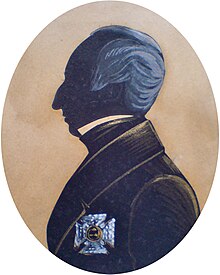John Cameron (1773–1844)
| Sir John Cameron | |
|---|---|

Lieutenant-General Sir John Cameron, KCB
|
|
| Born |
3 Jan 1773 Culchenna, Inverness, Scotland |
| Died |
23 Nov 1844 (aged 71) Guernsey, Channel Islands |
| Allegiance |
|
| Service/branch |
|
| Years of service | 1787-1844 |
| Rank | Lieutenant-General |
| Commands held |
43rd Regiment of Foot Western District |
| Battles/wars |
Invasion of Guadeloupe (1794) Peninsular War |
| Awards |
KCB Knight of the Tower and Sword (Portugal) |
| Relations | Captain Ewen Cameron, 43rd Foot, killed at Battle of the Côa, 24 July 1810 (brother) General Sir Duncan Alexander Cameron GCB (1808-1888) (son) Maj.-Gen. John Cameron RE, CB, FRS (1817-1878), Director-General of the Ordnance Survey (son) |
Lieutenant-General Sir John Cameron, KCB (3 January 1773 - 23 November 1844), of Culchenna, Inverness, Scotland, was a British Army officer and commander during the French Revolutionary Wars and the Napoleonic Wars.
Cameron was commissioned as an ensign on 25 September 1787. He served in the West Indies with the 43rd Regiment of Foot, under Sir Charles Grey, and was present at the siege of Fort Bourbon, the capture of Martinique, St. Lucia and Guadaloupe, and at the assault made by the enemy of Fleur d'épée; he next served under Brigadier-General C. Graham at Berville Camp in Guadaloupe; and commanded the Regiment engaged in the action of the 30 September 1794, and in different attacks made by the enemy until 4 October 1794, when he was severely wounded and taken prisoner, in which situation he remained two years (on a prison hull at Pointe-à-Pitre).
He received the Gold Medal for his services at the Battle of Vimeiro, Battle of Corunna, Battle of Bussaco, Battle of Salamanca, Battle of Vitoria, Siege of San Sebastián and Battle of Nive. "In consideration of his eminent services, and we can honestly assert that there was not a better soldier in any army; he was nominated a Knight Commander of the Military Order of the Bath, by his Sovereign. The Portuguese Government conferred the Order of the Tower and the Sword on Sir John for the able services he rendered to that nation."
...
Wikipedia
